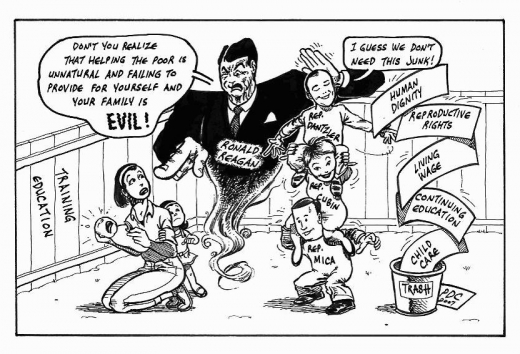
"The Psychology of Inequality"
Researchers find that much of the damage done by being poor comes from feeling poor.
By Elizabeth Kolbert 15 Jan 2018
"Keith Payne, a psychologist, remembers the exact moment when he learned he was poor. He was in fourth grade, standing in line in the cafeteria of his elementary school, in western Kentucky. Payne didn’t pay for meals—his family’s income was low enough that he qualified for free school lunch—and normally the cashier just waved him through. But on this particular day there was someone new at the register, and she asked Payne for a dollar twenty-five, which he didn’t have. He was mortified. Suddenly, he realized that he was different from the other kids, who were walking around with cash in their pockets."
"Feeling poor, meanwhile, has consequences that go well beyond feeling. People who see themselves as poor make different decisions, and, generally, worse ones. "
The research is complex, but important. Money, by itself, does not raise people from poverty of put people in a middle class state of mind.
"The tax bill recently approved by Congress directs, in ways both big and small, even more gains to the country’s plutocrats. Supporters insist that the measure will generate so much prosperity that the poor and the middle class will also end up benefitting. But even if this proves true—and all evidence suggests that it will not—the measure doesn’t address the real problem. It’s not greater wealth but greater equity that will make us all feel richer."
I do not expect Congress to read or understand the research. I expect Congress to go for the low hanging fruit, the easy way out - just cut budgets and welfare rolls.
Ryan channels Reagan on welfare . . . . mean spirited, foolish, unchristian, and wrong.
Most people are good and honest people.
Social programs are not pure socialism.
Empathy is OK, and is not communism.
Reaching out with a helping hand it the true ideal Christianity.
"Work requirements in welfare reform actually work"
By Rea S. Hederman Jr., opinion contributor — 01/12/18 01:30 PM EST 635The views expressed by contributors are their own and not the view of The Hill
http://thehill.com/opinion/finance/368725-work-requirements-in-welfare-reform-actually-work
"When President Bill Clinton William signed welfare reform into law, many critics warned of impending calamity for welfare recipients. Individuals on welfare would be unable to comply with work requirements and would face dire poverty. These critics underestimated the ability of welfare recipients to find work and stay employed.
Today, the debate is over the amount of gains welfare recipients who returned to work made, not whether or not they fell into dire poverty. Many recipients, particularly women, made large strides in the work force and increased their family income by work. It appears, this debate is going to be repeated, this time over Medicaid work requirements."
"After all these years, ‘welfare reform’ is the same racist dog whistle it always was"
By Jared Bernstein 8 Jan 2018
"I recently posted a piece on this page asking people, including those in the media, to avoid euphemisms, or, as columnist Michael Hiltzik calls them, “weasel words.” When conservative politicians say they want to “reform welfare” or “fix” or “overhaul” Medicare, nutritional assistance (SNAP, formerly food stamps), and so on, they mean they want to cut them, and there’s no reason to facilitate their misleading language.
But a number of people have pointed out that the problem with the phrase “welfare reform” isn’t just that “reform” means “cut.” It’s the coded racism in the word “welfare.” Those people are correct."
Correcting myths and cynical misconceptions.
"What are the relevant facts? Though minorities are often disproportionately represented, most recipients of anti-poverty support are white. Most adult, able-bodied poor people work or look for work, as you can’t begin to support a family on safety-net programs. SNAP (nutritional support) pays $1.40 per meal! Medicaid provides health coverage, not income with which you can pay rent or child care. More than half of households with a non-disabled, working-age adult receiving food support work in the paid labor market; 82 percent worked in the year before or will do so in the year after getting SNAP; 87 percent for families with kids. And, for the record, we shouldn’t be surprised to see unemployed people on SNAP or Medicaid. That’s what the safety net is supposed to be there for — to catch economically vulnerable people amid market failures.
But surely these low-income programs are an increasing source of our fiscal stress? Not so. Outside of health care, which has its own set of problems, spending on low-income programs is at its historical level of just above 2 percent of GDP, and it’s slated to soon fall below that average."
Here the bottom line of scary . . .
"it is not the scope or depth of the safety net that’s troubling the nation. In fact, such social protections are much slimmer here than in other advanced nations. It’s not SNAP, Medicaid, immigration or low-income minorities taking things away from low-income whites that’s holding back America.
It’s the ignoring of facts like those noted above, it’s the lies of the president, it’s that horrifying interview I just heard with CNN’s Jake Tapper and White House policy adviser Stephen Miller, it’s the faux populist forgetter-in-chief phonily going on about the “forgotten men and women,” it’s the least representative Congress of my lifetime (and I’m old). Everything else is dangling the keys, and I, for one, will not be distracted."
Tweety's base will support him until he shoots them dead.
